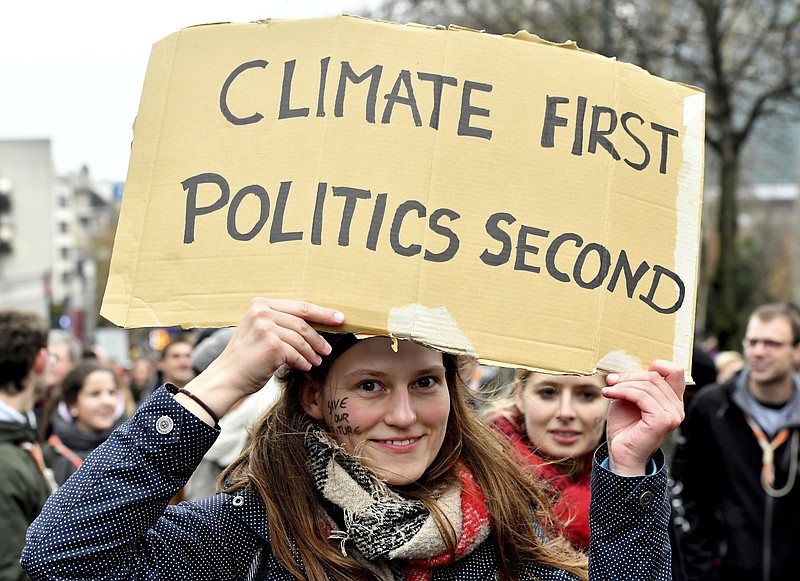It's time for a come-to-Earth meeting - and time to get America's energy policy back together.
After three years of decline, U.S. carbon dioxide emissions rose sharply last year, despite a record number of coal-fired power plants closing or converting to different fuels.
Based on preliminary power generation, natural gas and oil consumption data, the Rhodium Group, a leading economic, climate, social and political research group, estimates that U.S. carbon emissions increased by 3.4 percent in 2018.
The spike marks the second largest annual gain in more than two decades, surpassed only by 2010 when the economy bounced back from the Great Recession, according to Rhodium.
And, no, we can't blame Trump. We can blame - you guessed it - climate change itself and our own growth.
Driven by a climate extreme of unusually cold weather at the start of 2018, especially in the Northeast, power demand grew, even with the expansion of low-energy appliances and lights.
And as our economy grew at a strong pace last year, emissions from factories, planes and trucks soared. That led to robust growth in the demand for diesel and jet fuel, offsetting a modest decline in domestic gasoline consumption. Thus transportation - not power generation - held its title as the largest source of U.S. emissions for the third year running.
Those numbers - a robust economy even before Trump's regulatory rollbacks could have an impact - undercut one of the Trump administration's key defenses for dismissing federal science reports that show the extremes of climate change will wreak havoc on that economy, kill people and cause still more extreme weather events: We had all those regulations and still grew, grew, grew.
Yet now we will risk that growth success if we pursue fewer policies to clean up the power and transportation sectors and innovate.
Last week, New York Times columnist Tom Friedman repeated a call he'd made in 2007 for a Green New Deal focused on innovation as an economic, industrial and national security growth model. In 2008, then-presidential candidate Barack Obama made it part of his platform, but as Friedman put it, "the idea just never took off."
Now new Democratic Congresswoman Alexandria Ocasio-Cortez of New York and others are giving the idea new love.
That's great. Friedman's glad, and so are we - with a big "but."
We'd rather the push carry a little less of the liberal baggage that Ocasio-Cortez will give it and a little more of the hunter-farmer-preacher-factory worker burnish that it deserves.
There is no doubt that we need a Green New Deal - and the alternative energies it could build on. But we - the whole nation - must find a way to help conservative politicians and progressive politicians come to an understanding: Not all environmentalists eat tofu, fruits and nuts. Likewise, hunters and farmers know that saving energy is good for both game and crops, and therefore their wallets.
This is particularly true in the South which, according to 2017 research estimating economic damage from climate change published in Science Magazine, stands to suffer the most negative impacts. Coastal properties will be rendered unlivable, and heat will wither inland crops and factory output.
And we need more than just a bridge for the political divide. We need lifeboats for the cultural sea change that global warming presents for voters and ordinary Americans - especially conservative, Southern evangelicals. They have no difficulty with the Biblical flood that prompted Noah to build an ark but can't wrap their heads around the thought that we should find a way to use the sun and wind to power our churches toward greater stewardship of the Earth.
Yes, it true that we shouldn't stereotype. There are evangelicals who've spoken out in favor of environmental sustainability and there are environmentalists who drive gas-guzzler SUVs. But face it: those are the exceptions, not the rule.
The Guardian has a new columnist, Megan Mayhew Bergman, who is focusing on this kind of Southern, cultural climate disconnect in a personal column she calls "Climate Changed."
In December, she talked with evangelicals about it in the Southeast. Scott Coleman, a practicing Baptist, acknowledged that "environmental stewardship is often associated with liberal politics, thus looked upon negatively."
But as the environmental manager of Little St. Simons Island off the coast of Georgia, Coleman sees the value of protecting our Earth: "I think that if our faith leaders in the South were more outspoken about the importance of creation care, it would go a long way in helping to depoliticize environmental issues in our region," he told Bergman. "And if we could depoliticize environmental stewardship in the South, imagine the progress we could make."
Yes. Let's try it.
